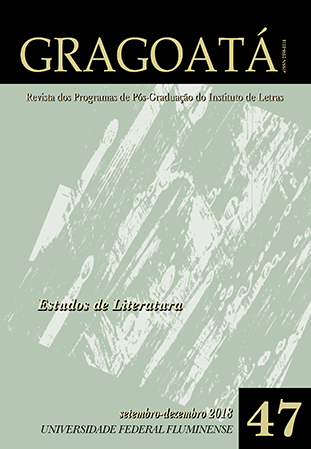Precarious humanity: the double in dystopian science fiction
DOI:
https://doi.org/10.22409/gragoata.v23i47.33608Palavras-chave:
identidade, o “eu”, duplo, clone, sociedade contemporânea.Resumo
The double is a common feature in fantastic fiction, and it plays a prominent part in the Gothic revival of the late nineteenth century. It questions the notion of a coherent identity by proposing the idea of a fragmented self that is at the same time familiar and frighteningly other. On the other hand, the double is also a way of representing the tensions of life in large urban centers. Although it is more usually associated with the fantastic, the motif of the double has spread to other fictional genres, including science fiction, a genre also concerned with the investigation of identity and the nature of the human. The aim of this article is to discuss the representation of the double in contemporary science fiction, more particularly in its dystopian mode, where the issue of identity acquires a special relevance, since dystopias focus on the troubled relation between individual and society. Works such as Greg Egan’s short story “Learning to Be Me”; White Christmas, an episode from the television series Black Mirror; Kazuo Ishiguro’s novel Never Let Me Go; and the film Moon, directed by Duncan Jones, will be briefly examined in order to trace the ways the figure of the double has been rearticulated in dystopian science fiction as a means to address new concerns about personal identity and the position of the individual in society.
------------------------------------------------------------------------------------------
HUMANIDADE PRECÁRIA: O DUPLO NA FICÇÃO CIENTÍFICA DISTÓPICA
O duplo é um elemento comum na literatura fantástica e desempenha um papel importante na retomada do gótico no final do século XIX. Ele questiona a noção de uma identidade coesa ao propor a ideia de um “eu” fragmentado que é ao mesmo tempo familiar e assustadoramente outro. Por outro lado, o duplo também é uma maneira de representar as tensões da vida nos grandes centros urbanos. Apesar de ser costumeiramente associado ao fantástico, o motivo do duplo se espalhou para outros gêneros, incluindo a ficção científica, gênero também preocupado com a investigação da identidade e da natureza do humano. O objetivo deste artigo é discutir a representação do duplo na ficção científica contemporânea, mais especificamente na sua modalidade distópica, onde a questão da identidade adquire uma relevância especial, uma vez que a distopia tem como foco a relação atribulada entre indivíduo e sociedade. Obras como o conto “Learning to Be Me”, de Greg Egan; White Chistmas, episódio da série de televisão Black Mirror; o romance Never Let Me Go, de Kazuo Ishiguro; e o filme Moon, dirigido por Duncan Jones, serão brevemente analisados a fim de rastrear as maneiras como a figuro do duplo é rearticulada na ficção científica distópica como um meio de trabalhar novas inquietações a respeito da identidade pessoal e da posição do indivíduo na sociedade.
---
Original em inglês.
Downloads
Downloads
Publicado
Edição
Seção
Licença
AUTORIZAÇÃO
Autores que publicam em Gragoatá concordam com os seguintes termos:
Os autores mantêm os direitos e cedem à revista o direito à primeira publicação, simultaneamente submetido a uma licença Creative Commons Atribuição 4.0 Internacional (CC BY 4.0), que permite o compartilhamento por terceiros com a devida menção ao autor e à primeira publicação pela Gragoatá.
Os autores podem entrar em acordos contratuais adicionais e separados para a distribuição não exclusiva da versão publicada da obra (por exemplo, postá-la em um repositório institucional ou publicá-la em um livro), com o reconhecimento de sua publicação inicial na Gragoatá.
A Gragoatá utiliza uma Licença Creative Commons - Atribuição CC BY 4.0 Internacional.











